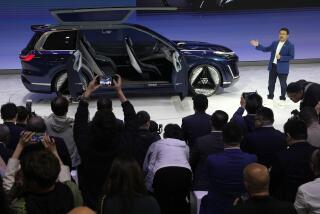U.S. prevails in WTO dispute with China over auto tariffs
The World Trade Organization sided with the U.S. in a dispute with China over duties on imported American automobiles, the latest in a series of victories that the Obama administration hopes will halt Beijing’s use of questionable tariffs to settle political scores.
“This is the third time that the United States has prevailed in a WTO dispute challenging China’s unjustified use of trade remedies,” U.S. Trade Representative Michael Froman said Friday.
“The message is clear: China must follow the rules, just like other WTO members,” he said in announcing a largely symbolic victory, given that the auto tariffs imposed in 2011 had been lifted last year.
Tensions are running high between the two economic superpowers, exacerbated this week by the Justice Department’s cyber-spying allegations against five Chinese military officers. The new ruling is unlikely to end the trade battles, said Washington lawyer Jay L. Eizenstat, a former U.S. trade negotiator.
“I’d like to think this case would have a deterrent effect. I don’t think it will,” he said. “We’re likely to see at least the same level of WTO litigation between the United States and China, perhaps heightened, in the coming months.”
The U.S. and China have been engaged in a high-stakes game of tit for tat since President Obama took office, fueled by long-running Democratic concerns that Beijing wasn’t playing fair as its economy had grown into an exporting behemoth with the help of its membership in the WTO since 2000.
Adding to the problems between the two nations are consistent accusations from Washington that China is manipulating its currency to make its exports more affordable around the world.
In 2009, the U.S. imposed anti-dumping tariffs of as much as 35% on Chinese tires that had flooded the American market. China challenged the move with the WTO, but lost.
With the administration looking to take similar actions in 2011 against China for dumping low-cost solar panels in the U.S. and for restricting imports of American broiler chickens, Beijing fought back.
The Chinese government imposed duties ranging from 2% to 21.5% on imports of large American-made cars and sport utility vehicles. The tariffs affected about two-thirds of the $8.5 billion worth of U.S. auto exports to China, administration officials said.
China is the second-largest foreign market for U.S. automakers after Canada, accounting for 13% of U.S. exports last year.
China enacted the anti-dumping and countervailing duties after it said that imported American vehicles had been sold at below fair-market value and had benefited from U.S. subsidies, such as the bailouts of General Motors Corp. and Chrysler.
But the Obama administration argued that the move was simply retaliation. U.S. officials said Beijing was unable to show that any U.S. subsidies harmed the Chinese auto industry, a requirement for anti-dumping duties.
On Friday, a WTO panel largely sided with the U.S. and recommended China bring its policies in compliance with anti-dumping rules. China had removed the duties last year as the U.S. pressed its case with the World Trade Organization.
The Chinese embassy in Washington could not be reached for comment on the ruling.
Last year, $5.1 billion worth of targeted vehicles were exported to China. Senior U.S. trade representative officials did not have an estimate on the effect of the added tariffs on American sales in China.
U.S. officials said the Chinese duties affected vehicles manufactured in California and nine other states. The duties were applied to cars and SUVs with an engine capacity greater than 2.5 liters, including the Jeep Grand Cherokee and Cadillac Escalade.
Lawmakers from some of those states, particularly Michigan and Ohio, praised the ruling and called on China to halt its use of discriminatory tariffs.
“It is laughable for China, the biggest dumping perpetrator in the world, to claim that U.S. vehicle exports are being sold in China below the cost of production when they obviously are not,” said Sen. Carl Levin (D-Mich.).
Sen. Debbie Stabenow (D-Mich.) commended the Obama administration for aggressively going after China for “illegal and improper activities.”
“In the global economy, we have to have a level-playing field in order to be able to export and in order to be able to compete in a fair way,” she said. “And if we have a level playing field, we win.”
The ruling also was cheered by some Republicans from auto industry states.
“China remains a vital export market for American goods and services, but China must follow global trade rules. And when they don’t, we’ll hold them accountable every time,” said Sen. Rob Portman (R-Ohio), a former U.S. trade representative.
Losing a WTO case is a deterrent for most countries, but not necessarily for China, Eizenstat said. The nation’s leaders use tariffs to send messages, particularly against the U.S. They also bank on the WTO process being long enough that the higher tariffs can be collected for a couple of years before China rescinds them.
“I wouldn’t put it past them to impose dumping duties and countervailing duties of questionable merit in the future,” he said. “If they see it is in their near-term interest to do it, they will. If a couple of years later they lose, that’s a calculus they’re willing to make.”
More to Read
Inside the business of entertainment
The Wide Shot brings you news, analysis and insights on everything from streaming wars to production — and what it all means for the future.
You may occasionally receive promotional content from the Los Angeles Times.











